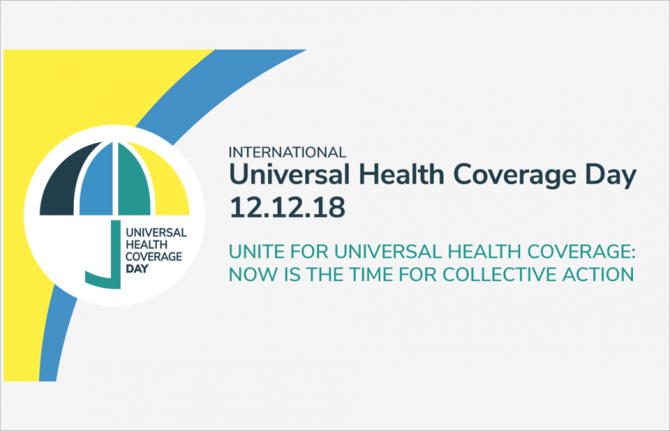

Press Statement
Message on the occasion of Universal Health Coverage Day
12 December 2018 12 December 2018Health is everyone’s concern. The world has been striving for access to quality and affordable health services since the Declaration of Alma-Ata, which called for health for all more than 40 years ago.
We have come a long way since then—improvements in access to, and the quality of, health-care services have increased life expectancy globally from 62 to 72 years. Yet progress is far from equal. Today, more than half of the world’s population do not have full access to essential health services, because they are unaffordable, inadequate, inaccessible for certain groups or simply unavailable.
There is increasing inequity around the world, with the richest 1% of the population now owning half of the world’s wealth. Life expectancy in the poorest countries of the world is appreciably lower than in the wealthiest, and living in areas blighted by poverty can mean a shorter life span and a lost future. The disparity is observed between countries and between different communities within countries, with the most vulnerable, marginalized and stigmatized being left behind.
Making progress towards universal health coverage that is truly universal means making progress towards equity, inclusion and social justice. It means a people-centred, human rights-based approach and community-led service delivery, as well as a recognition of the need to address the social determinants of health, including necessary reforms of laws and policies and removing stigma and discrimination and gender inequity.
The global response to HIV has illustrated the critical measures—decisive political leadership and commitment, community engagement and a response informed by scientific evidence—that can change the course of a global epidemic.
Reaching time-bound HIV prevention and treatment targets will make an important contribution to achieving the universal health coverage targets, and together will significantly accelerate progress towards realizing the Sustainable Development Goals.
In recognition of the theme of this year’s Universal Health Coverage Day, “Unite for universal health coverage: now is the time for collective action”, I call on everyone to embrace and contribute to the universal health coverage movement. United, we can make universal health coverage a reality for all.
12 December 2018
Michel Sidibé
Executive Director of UNAIDS
UNAIDS
The Joint United Nations Programme on HIV/AIDS (UNAIDS) leads and inspires the world to achieve its shared vision of zero new HIV infections, zero discrimination and zero AIDS-related deaths. UNAIDS unites the efforts of 11 UN organizations—UNHCR, UNICEF, WFP, UNDP, UNFPA, UNODC, UN Women, ILO, UNESCO, WHO and the World Bank—and works closely with global and national partners towards ending the AIDS epidemic by 2030 as part of the Sustainable Development Goals. Learn more at unaids.org and connect with us on Facebook, Twitter, Instagram and YouTube.
Press centre
Download the printable version (PDF)
